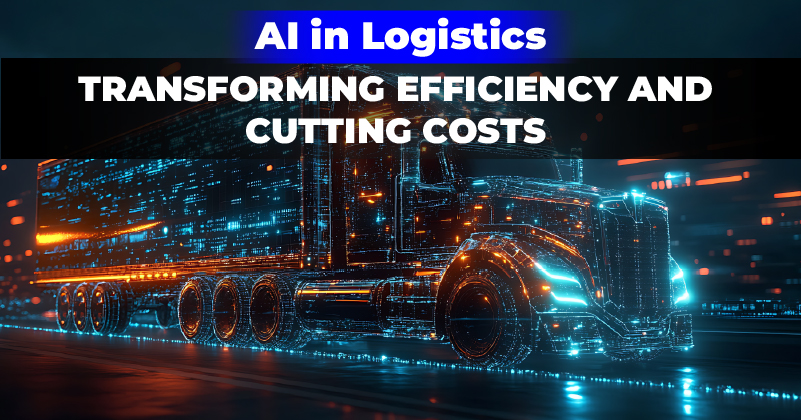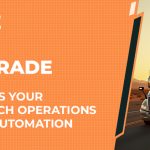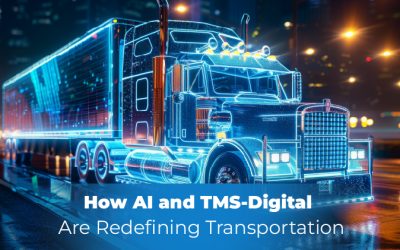
Artificial Intelligence (AI) is fundamentally changing the logistics industry by leveraging its advanced data processing, pattern recognition, and decision-making capabilities. The potential of AI in logistics is immense, with the ability to revolutionize supply chain management, enhance efficiency, and reduce costs. By optimizing fleet management, improving supply chain visibility, and utilizing predictive analytics, AI in logisttics offers numerous benefits that are set to transform the logistics landscape.
Optimized Fleet Management
AI, in combination with Internet of Things (IoT) technologies, enables real-time monitoring of vehicles and assets, allowing logistics companies to optimize fleet management. AI-driven solutions facilitate efficient route planning, reduce idle times, minimize fuel consumption, and predict maintenance needs. This streamlines operations, cuts costs, and significantly enhances overall efficiency.
Enhanced Visibility
AI and IoT technologies provide real-time insights into inventory, shipments, and environmental conditions, greatly improving supply chain visibility. This enhanced visibility helps companies to monitor their operations more closely and make data-driven decisions to ensure smooth logistical processes.
Predictive Analytics
AI and IoT also play a crucial role in enabling predictive analytics. By accurately forecasting demand, optimizing inventory levels, and aligning operations with customer needs, these technologies help logistics companies to stay ahead of the curve and meet customer demands efficiently.
Driverless Vehicles
AI is paving the way for the widespread adoption of driverless vehicles in logistics, offering significant cost savings, improved road safety, and the automation of truck fleets. The integration of AI and IoT in autonomous vehicles promises to revolutionize logistics, bringing unprecedented levels of efficiency and safety.
Intelligent Route Planning
AI algorithms, supported by real-time IoT data, enable intelligent route planning, reducing fuel consumption and travel time, which ensures timely deliveries. This optimization leads to lower operational costs and improved customer satisfaction, making intelligent route planning a critical application of AI in logistics.
Smart Warehouse Management
AI and IoT technologies provide logistics companies with real-time data on inventory, storage, and order fulfilment, facilitating smart warehouse management. By automating inventory tracking and order fulfilment processes, AI reduces errors, enhances accuracy, and increases operational efficiency.
Incorporating AI into logistics operations leads to significant cost savings, optimized inventory management, and improved service levels. AI-driven demand forecasting reduces errors and improves vehicle dispatch efficiency, helping to lower costs and avoid stockouts.
A Decade of AI in Logistics: Pioneering Automated Routing and Dispatch
The transportation and logistics industry has recognized the potential of AI to optimize operations for over a decade. AI-powered logistics software, with its automated routing and dispatch capabilities, has been at the forefront of this technological revolution.
Back in the 2010s, logistics companies identified the inefficiencies and time-consuming nature of manual planning processes. This realization led to the development of AI-powered solutions designed to automate and streamline essential tasks. The introduction of automated routing and dispatch systems marked a significant milestone, with these systems leveraging machine learning algorithms and historical data to optimize routes and make real-time decisions.
Over the years, these AI-powered systems have evolved, incorporating advancements such as IoT sensors and real-time data feeds. Today, they utilize vast amounts of data, including live traffic updates and weather conditions, to make intelligent routing decisions. The algorithms have also become more sophisticated, learning from past experiences and adapting strategies accordingly.
By optimizing routes and automating resource allocation, logistics companies have achieved significant cost savings and improved delivery times. Early adopters of AI in logistics have gained a competitive edge by harnessing its benefits, positioning themselves to capitalize on future advancements.
Top 5 AI Applications in Logistics
- Route Optimization
AI-powered route optimization is one of the most valuable applications in logistics. By analyzing real-time data such as traffic conditions, weather forecasts, and delivery constraints, AI helps logistics companies identify the most efficient routes for their vehicles. This results in shorter travel times, lower fuel consumption, and improved delivery schedules, leading to cost savings and increased customer satisfaction.
- Demand Forecasting and Inventory Management
AI-powered demand forecasting is a game-changer for logistics companies. By analyzing historical data, market trends, and customer behavior, AI accurately predicts future demand, allowing companies to manage inventory levels effectively, avoid stockouts, and better meet customer needs. This powerful tool helps logistics companies stay ahead of the competition while minimizing costs.
- Smart Warehouse Management
AI and IoT technologies are crucial for smart warehouse management. By providing real-time data on inventory levels, storage conditions, and order fulfillment status, AI enables logistics companies to make informed decisions, automate inventory tracking, and streamline order fulfillment processes. This reduces errors, improves accuracy, and increases customer satisfaction.
- Returns Automation
AI is also transforming returns management in logistics. AI-powered returns automation systems evaluate and process returned products quickly and accurately, reducing manual effort and improving the overall returns handling process. This not only enhances the customer experience but also reduces the costs associated with returns. By efficiently managing inventory and reducing waste, logistics companies can achieve significant cost savings.
- Predictive Maintenance
AI analytics play a vital role in predictive maintenance by analyzing sensor data from vehicles and equipment. By detecting patterns and identifying potential issues before they become problems, AI enables logistics companies to implement predictive maintenance systems, reducing downtime and preventing costly equipment failures. This proactive approach improves fleet performance and operational efficiency.
While route optimization is a standout application of AI in logistics, it’s essential to recognize that other areas, such as demand forecasting, warehouse management, and predictive maintenance, are equally important in improving efficiency, reducing costs, and enhancing customer service.
AI-Driven Route Planning and Optimization: A Game Changer for Logistics Efficiency
Efficient route planning and transportation optimization are critical to the success of logistics operations, as they have a significant impact on cost savings, delivery times, fuel consumption, and overall operational efficiency. With the advent of AI algorithms and predictive analytics, route planning and fleet management have undergone a transformation, offering unparalleled advantages to logistics companies.
In the past, traditional route planning methods relied on manual calculations and subjective decision-making, often resulting in suboptimal routes, increased fuel consumption, longer delivery times, and inefficient fleet utilization. With AI’s emergence, logistics companies now have access to powerful algorithms that process vast amounts of data in real time, enabling intelligent and data-driven route planning and optimization.
AI algorithms analyze various factors, including traffic congestion, weather conditions, road closures, delivery time windows, and vehicle capacity, to determine the most efficient routes for each delivery or pickup. This results in reduced travel times, lower fuel consumption, and timely deliveries. Additionally, these systems can adapt to changing conditions and provide real-time updates to drivers, further enhancing operational efficiency.
Predictive analytics, driven by AI, leverages historical data, market trends, and customer behavior to forecast future demand accurately and identify patterns. By optimizing routes based on predicted demand, logistics companies can align their operations with customer needs, reducing the risk of stockouts or excess inventory.
 The benefits of AI-driven route planning and transportation optimization are substantial. Numerous studies and industry reports highlight the advantages of implementing AI in logistics operations, including:
The benefits of AI-driven route planning and transportation optimization are substantial. Numerous studies and industry reports highlight the advantages of implementing AI in logistics operations, including:
Cost Savings: AI algorithms, combined with real-time data, enable logistics companies to identify the most efficient routes, leading to reduced fuel usage and lower operational costs. Studies have shown that businesses can achieve significant fuel savings by implementing AI-powered route optimization
Improved Efficiency: By optimizing routes and allocating resources effectively, AI-driven systems streamline logistics operations, improving delivery times, reducing idle times, and boosting productivity. With fewer delays and optimized schedules, companies can handle more deliveries each day, increasing operational efficiency.
Enhanced Customer Satisfaction: Faster routes and on-time deliveries lead to happier customers. AI-powered route planning ensures that deliveries are made within the promised time frames, improving customer satisfaction and loyalty. Satisfied customers are more likely to become repeat customers and recommend the logistics company to others.
Reduced Carbon Footprint: Optimized routes result in lower fuel consumption and reduced emissions. By minimizing travel distances and eliminating unnecessary idling or detours, AI-driven route planning contributes to sustainability and environmental conservation.
Better Decision-Making: AI in logistics provides valuable insights by analyzing large volumes of data. Logistics companies can use this information to make informed decisions, identify areas for improvement, and adapt their strategies accordingly. Predictive analytics also helps in demand forecasting, allowing businesses to align their inventory levels with customer needs.
Driving Savings and Increasing Revenue: The Power of Optimization in Logistics
Optimizing route planning and transportation in logistics can result in substantial savings in fuel costs and workforce expenses, while also increasing revenue. Through the use of AI algorithms and predictive analytics, logistics companies can unlock significant cost-saving opportunities and enhance overall profitability.
Fuel Cost Reduction: AI-driven route optimization is a powerful tool for logistics companies to reduce travel distances and idle times by considering factors like traffic congestion and road conditions. This results in substantial fuel savings, which is particularly important given the significant impact of fuel costs on overall operational expenses. Research consistently shows that implementing AI-based route optimization can lead to fuel savings ranging from 10% to 20%, depending on the specific logistics operations and routes involved.
Workforce Efficiency: Traditional route planning and dispatch processes are time-consuming and labor-intensive. By leveraging AI algorithms, logistics companies can automate these tasks, streamlining the planning process and reducing the time and manpower required for manual route planning. This frees up employees to focus on other value-added activities, improving overall workforce efficiency.
Increased Delivery Capacity: AI-driven optimization allows logistics companies to maximize their delivery capacity without requiring additional resources. By identifying the most efficient routes, minimizing empty miles, and optimizing vehicle usage, companies can handle more deliveries with the same fleet, increasing their operational capacity.
Reduced Operational Costs: Efficient route planning and transportation optimization directly impact various operational costs. By reducing travel distances, logistics companies can lower vehicle maintenance costs, prolong vehicle lifespan, and reduce repair expenses. Optimized routes also minimize the risk of delays and associated penalties, helping to prevent potential financial losses.
Enhanced Customer Satisfaction and Revenue: Efficient route planning ensures on-time deliveries, which directly impacts customer satisfaction and loyalty. Satisfied customers are more likely to continue doing business with a logistics company, potentially resulting in repeat orders and increased revenue. Reliable and timely deliveries also enhance the company’s reputation, attracting new customers and expanding market opportunities.
It’s important to note that the benefits of optimization extend beyond immediate cost savings. The increased efficiency and accuracy achieved through AI-driven route planning and transportation optimization lead to improved overall operational performance. Logistics companies benefit from better resource allocation, reduced risks, and streamlined operations, ultimately enhancing their competitive edge in the market.
Conclusion
The integration of AI-driven route planning and transportation optimization into logistics operations offers numerous advantages, including cost savings and increased revenue. By utilizing AI algorithms and predictive analytics, logistics companies can streamline their operations, improve efficiency, and better serve their customers.
The impact of AI-driven route planning and transportation optimization extends beyond immediate financial benefits. It enhances overall operational performance, improves resource allocation, reduces risks, and streamlines logistics processes. These improvements contribute directly to customer satisfaction, as reliable and timely deliveries create positive customer experiences. Satisfied customers are more likely to recommend the logistics company to others, generating new business opportunities and expanding the customer base.
If you’re ready to elevate your last-mile deliveries, consider exploring TMS-Digital’s automated systems. Say goodbye to inefficient routes and hello to optimized operations that save both time and money. With full operational visibility at your fingertips, you’ll be able to make informed decisions that streamline your entire process. Delight your customers with faster fulfilment and real-time updates that keep them informed.
With years of industry experience, TMS-Digital offers a comprehensive feature set tailored to meet all your logistics needs. Seamlessly integrate, plan routes effortlessly, dispatch with ease, and keep your customers informed every step of the way. Empower your logistics operations with TMS-Digital’s fully integrated ecosystem. Contact us today for more information.









